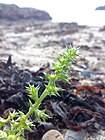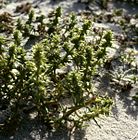Note: This is a project under development. The articles on this wiki are just being initiated and broadly incomplete. You can Help creating new pages.
Salsola kali
Salsola kali is an annual plant that can grow up to 0.60 metres tall. It is harvested from the wild for local use as a food, medicine and source of materials.
Contents
- 1 Uses
- 2 Parts Used
- 3 Chemical Composition
- 4 Common names
- 5 Properties
- 6 Habit
- 7 Identification
- 8 List of Ayurvedic medicine in which the herb is used
- 9 Where to get the saplings
- 10 Mode of Propagation
- 11 How to plant/cultivate
- 12 Commonly seen growing in areas
- 13 Photo Gallery
- 14 References
- 15 External Links
Uses
Blood pressure, Dropsy, Excrescences.[1]
Parts Used
Chemical Composition
It contains ferulic acid (1), p-coumaric acid (2), salicylic acid (3), tricin (4), selagin (5), acanthoside D (6), tricin -7-O-beta-D-glucopyranoside (7), tricin-4'-O-beta-D-apioside (8), isorhamnetin-7-O-beta-D-glucopyranoside (9), isorhamnetin-3-O-beta-D-glucopyranoside (10), isorhamnetin-3-O-alpha-L-arabinopyranosyl (1-->6) -beta-D-glucopyranoside[2]
Common names
| Language | Common name |
|---|---|
| Kannada | |
| Hindi | |
| Malayalam | |
| Tamil | |
| Telugu | |
| Marathi | |
| Gujarathi | |
| Punjabi | |
| Kashmiri | |
| Sanskrit | |
| English |
Properties
Reference: Dravya - Substance, Rasa - Taste, Guna - Qualities, Veerya - Potency, Vipaka - Post-digesion effect, Karma - Pharmacological activity, Prabhava - Therepeutics.
Dravya
Rasa
Guna
Veerya
Vipaka
Karma
Prabhava
Habit
Identification
Leaf
| Kind | Shape | Feature |
|---|---|---|
Flower
| Type | Size | Color and composition | Stamen | More information |
|---|---|---|---|---|
| {{{5}}} |
Fruit
| Type | Size | Mass | Appearance | Seeds | More information |
|---|---|---|---|---|---|
Other features
List of Ayurvedic medicine in which the herb is used
Where to get the saplings
Mode of Propagation
How to plant/cultivate
Requires a very sunny position in a light or medium well-drained soil. Tolerates maritime exposure. The plant is reported to tolerate an annual precipitation in the range of 26 to 97cm, an annual temperature in the range of 9.2 to 23.8°C and a pH of 7.0 to 7.9.[4]
Commonly seen growing in areas
Non-saline sandy beaches, Avoiding acid soils, Found on dry soils.
Photo Gallery
References
- ↑ Indian Medicinal Plants by C.P.Khare
- ↑ Chemical constituents
- ↑ [Morphology]
- ↑ Cultivation
External Links
- Ayurvedic Herbs known to be helpful to treat Blood pressure
- Ayurvedic Herbs known to be helpful to treat Dropsy
- Ayurvedic Herbs known to be helpful to treat Excrescences
- Herbs with Young leaves used in medicine
- Herbs with Stems used in medicine
- Herbs with Seeds used in medicine
- Habit - Annual
- Index of Plants which can be propagated by Seeds
- Herbs that are commonly seen in the region of Non-saline sandy beaches
- Herbs that are commonly seen in the region of Avoiding acid soils
- Herbs that are commonly seen in the region of Found on dry soils
- Herbs






